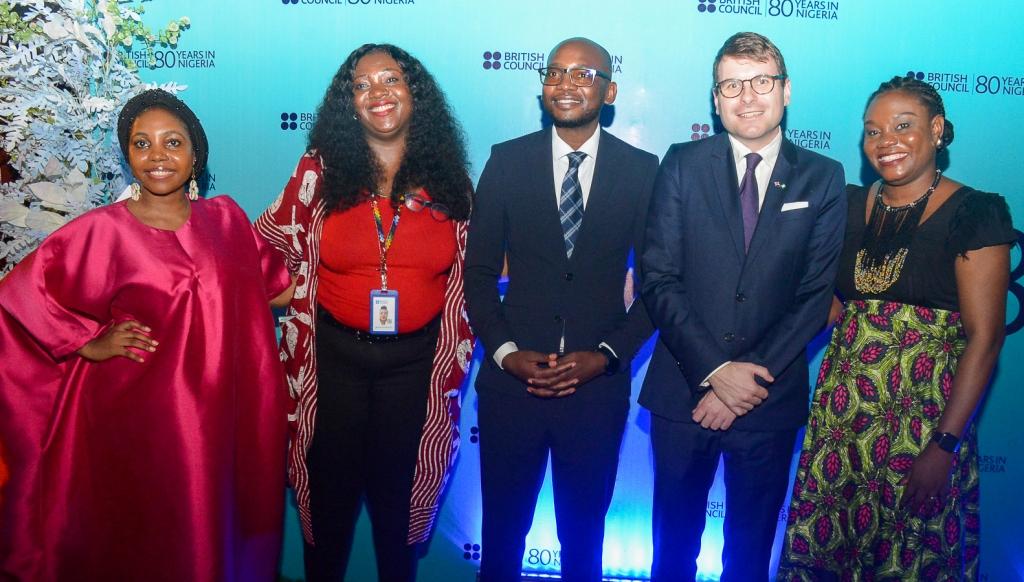General
British Council Reiterates Stronger Collaboration, Celebrates 80 Years of Impact in Nigeria

By Adedapo Adesanya
The British Council has reiterated that it will continue to strengthen its collaboration and operations in Nigeria as it marked its 80th-year presence in the country.
The British Council, the UK’s international organisation for cultural relations and educational opportunities, was founded in 1934 and was established in Nigeria in 1944. Over the course of 80 years, it has serviced Nigeria through its involvement in businesses, creativity, and education among others.
Over 100 guests, partners, beneficiaries, staff and partners from the public and private sectors gathered to honour eight decades of the British Council’s contributions to Nigeria’s educational and cultural landscape at a commemorative event held at its Ikoyi, office in Lagos on Thursday, November 7. The event emphasised the organisation’s dedication to fostering impactful change under the theme Amplifying the Voices of the Future.
In his welcome address, Mr Chilufya Besa, Acting Country Director of the British Council, reflected on the organisation’s long-standing role in supporting Nigerian communities and youth.
“The British Council in Nigeria has been at the forefront of fostering connections, empowering communities, and creating educational and cultural exchange pathways that have shaped countless lives.
“We are proud of the countless young people who have become employable, business owners, job creators, and agents of change within their communities through British Council-led programmes.”
“Since our establishment in Nigeria, the British Council has alongside Nigeria’s leaders, educators, artists, and communities to create opportunities that resonate across generations.
“Together, we have empowered millions of people with skills, education, and connections that transform lives. These milestones underscores the strength of the UK-Nigeria relationship which we are proud to support and nurture.”
He lauded the stakeholders and partners that have helped advance the course of the British government towards its goals.
He noted that Nigeria’s teeming young population was a goldmine that needed to be utilised, and added that the British Council saw it fit to collaborate efforts that are aimed at building capacity for the future.
Mr Besa also noted that evidence of its operations has shown in African entrepreneurs tapping into sustainable creative businesses and that it will continue to support them in their journeys across education, film, music, art, and businesses.
Reflecting on the theme of the celebration, representing The Deputy High Commissioner, Simon Field, Deputy Head of Mission, Foreign, Commonwealth & Development Office (FCDO), added in his opening speech, “Amplifying the Voices of the Future is especially fitting for our 80th anniversary in Nigeria, as it indicates our commitment to empowering young people, who are Nigeria’s future leaders, creators, and innovators.”
“We remain committed to fostering deeper connections, creating opportunities for young people, and building a future that respects cultural heritage while embracing innovation and inclusivity,”
The event featured two fireside chats, each delving into the impact and future potential of youth empowerment in Nigeria. The first discussion which focused on Unlocking the Economic Potential of Young People Now and in the Future, was led by the Regional Lead for Creative Economy, SSA, and Head of Arts Nigeria at the British Council, Ms Brenda Fashugba. This insightful session examines strategies to boost youth economic engagement and equip young Nigerians for future success.
The second conversation focused on Enhancing Youth Voices in Delivering Effective and Sustainable Change, was moderated by Ms Edemekong Uyoh, Regional Head of Marketing, Cultural Engagement, SSA at the British Council, and emphasised the importance of youth perspectives in achieving sustainable development.
Adding to the evening’s inspiring atmosphere were performances by spoken word artists – Kehinde Adollo and King David Ayo-Loto, whose powerful pieces reflected the theme and the impact of the British Council’s 80 years in Nigeria. The event also showcased a live painting session by celebrated artist Haneefah Adam, whose artwork was presented to Acting Country Director Chilufya Besa as a commemorative gift.
General
Nigeria’s Democracy Suffocating Under Tinubu—Atiku

By Modupe Gbadeyanka
Former Vice President, Mr Atiku Abubakar, has lambasted the administration of President Bola Tinubu for the turnout at the FCT Area Council elections held last Saturday.
In a statement signed by his Media Office, the Adamawa-born politician claimed that the health of Nigeria’s democracy under the current administration was under threat.
According to him, “When citizens lose faith that their votes matter, democracy begins to die. What we are witnessing is not mere voter apathy. It is a direct consequence of an administration that governs with a chokehold on pluralism. Democracy in Nigeria is being suffocated slowly, steadily, and dangerously.”
He warned that the steady erosion of participatory governance, if left unchecked, could inflict irreversible damage on the democratic fabric painstakingly built over decades.
“A democracy without vibrant opposition, without free political competition, and without public confidence is democracy in name only. If this chokehold is not released, history will record this era as the period when our hard-won freedoms were traded for fear and conformity,” he stressed.
Mr Atiku said the turnout for the poll was below 20 per cent, with the Abuja Municipal Area Council (AMAC) recording 7.8 per cent.
He noted that such civic participation in the nation’s capital, the symbolic heartbeat of the federation, is not accidental, as it is the predictable outcome of a political environment poisoned by intolerance, intimidation, and the systematic weakening of opposition voices.
The presidential candidate of the People’s Democratic Party (PDP) in the 2023 general elections stated that the ruling All Progressives Congress (APC) under Mr Tinubu has pursued a deliberate policy of shrinking democratic space, harassing dissenters, coercing defectors, and fostering a climate where alternative political viewpoints are treated as threats rather than contributions to national development.
He called on opposition parties and democratic forces across the country to urgently close ranks and forge a united front, declaring, “This is no longer about party lines; it is about preserving the Republic. The time to stand together to rescue and rebuild Nigeria is now.”
General
Nigeria Eyes Full Entry into Council of Palm Oil Producing Countries

By Adedapo Adesanya
Nigeria is set to validate a technical committee report geared towards transitioning the country from observer status to full membership of the Council of Palm Oil Producing Countries (CPOPC) in April.
Mr Abubakar Kyari, Minister of Agriculture and Food Security, said this when the council’s mission visited him over the weekend in Abuja, noting that the ministry had constituted a technical committee to consider how the country would seamlessly transit from observer country to membership in CPOPC based on its strategic importance in palm oil production.
“We are conscious of the fact that the palm oil value chain is very strategic for us and identified it as an export crop that can drive foreign exchange for the country and ensure good health in terms of consumption.
“We are conscious of the fact that we need the support of CPOPC countries to provide the country with a new variety of seeds that are climate-smart and resistant so that they can be produced by farmers in the country,” he said.
Mr Alphonsus Inyang, President, National Palm Produce Association of Nigeria (NPPAN), said being a member of CPOPC Nigeria would target over 10 million tonnes of oil palm between 2026 and 2050.
“We are also targeting 2.5 million hectares from among Nigeria households who are out to produce one hectare each, geared towards a N20 trillion annual economy within this period from among Nigeria households.
“We are working side by side with the big players who will be developing plantations,” he said.
The Secretary-General of CPOPC, Ms Izzana Salleh, said the council’s mission to Nigeria was to see how the country could transit from observer status to full membership, among others
She said that the status of the country as an observer nation since 2024 would expire by November.
Ms Salleh assured the country of the council’s readiness to support its vision to strengthen domestic production, enhance food security and build a competitive and sustainable palm oil supply chain.
The official emphasised that being a member of the council would strategically position Nigeria for a greater future regarding oil palm production.
According to her, the visit is to strengthen the council’s engagement with Nigeria, including potential membership in CPOPC.
She said: “The council’s mission to Nigeria aims to advance both Nigeria’s national ambitions and Africa’s collective voice in global agricultural discussions.
“CPOPC was established to promote cooperation among producing nations, empower smallholders, advance sustainability, and ensure fair, science-based global dialogue on vegetable oils.
She emphasised that being a member of the council would strategically position the country for greater future prospects regarding oil palm production and the value chain, as well as export.
“We are ready to support Nigeria’s vision to strengthen domestic production, enhance food security, and build a competitive and sustainable palm oil supply chain,” she said.
General
Violence Mars APC Ward Congress in Oluyole

By Modupe Gbadeyanka
The ward congress of the All Progressives Congress (APC) in Oluyole Local Government Area of Oyo State on Saturday left several party members injured after a violence clash erupted.
According to reports, one of the injured persons was Mr Idowu Oyawale, who served as the campaign Director General of a House of Representatives member in the last general elections, Ms Tolulope Akande-Sadipe.
It was disclosed that he sustained severe injuries during the exercise and is currently receiving treatment at an undisclosed hospital.
The ward congress was organised by the ruling party to elect ward executives across the local government’s wards.
However, it was disrupted at Olomi Ward 7 by suspected heavily-armed political thugs allegedly linked to a member of the party.
It was claimed that the thugs invaded the congress venue at Olomi Basic School 1, dispersing party members and officials supervising the exercise, with stones, clubs and other weapons.
Eyewitnesses said tensions escalated unprovoked over delegates’ lists and ward executive positions. The disagreement reportedly degenerated into physical altercations before the violent attacks on some party members.
It was learnt that security operatives led a tactical team to restore order, peace, and disperse the attackers.
Reacting to the incident, some party leaders and elders condemned the violence, describing it as unfortunate and capable of undermining the credibility of the internal democratic process.
The leaders have called on party chieftains and President Bola Tinubu to immediately order an investigation into the violent attacks.
-

 Feature/OPED6 years ago
Feature/OPED6 years agoDavos was Different this year
-
Travel/Tourism10 years ago
Lagos Seals Western Lodge Hotel In Ikorodu
-

 Showbiz3 years ago
Showbiz3 years agoEstranged Lover Releases Videos of Empress Njamah Bathing
-

 Banking8 years ago
Banking8 years agoSort Codes of GTBank Branches in Nigeria
-

 Economy3 years ago
Economy3 years agoSubsidy Removal: CNG at N130 Per Litre Cheaper Than Petrol—IPMAN
-

 Banking3 years ago
Banking3 years agoSort Codes of UBA Branches in Nigeria
-

 Banking3 years ago
Banking3 years agoFirst Bank Announces Planned Downtime
-

 Sports3 years ago
Sports3 years agoHighest Paid Nigerian Footballer – How Much Do Nigerian Footballers Earn



















